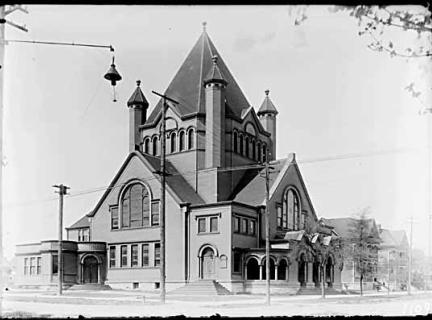Obituary Research

For genealogists, obituaries and death notices are important sources of family history sometimes leading to valuable clues for further research. Check out what resources the Library has to offer, and learn more about obituaries and death notices and how to find them.
Basics
Obituaries and death notices are very important sources for family historians. The two terms are often used interchangeably, although there is a slight difference in meaning.
- Death notices are usually submitted to the newspaper by the undertaker or funeral home handling arrangements, and are quite basic. The purpose of a death notice is to inform people of the location and time of funeral services.
- Obituaries are typically lengthier - more similar to news items - and may be written by a family member or newspaper staff.
Unlike civil birth, marriage and death registration, death notices and obituaries are not required by law, so there may not be one available for every death.
Death notices and obituaries vary greatly in length and content, although death notices are usually very brief.
Death notices may contain:
- Name of deceased
- Place of services and burial
- Names of survivors
Obituaries may also include:
- Age of deceased
- Names of deceased's parents
- Residence at time of death
- Former residences
- Mother's maiden name
- Place of death
- Names and residences of spouse and living relatives
- Names of people who sent flowers or came from a distance to attend the funeral
- Places of employment
- Affiliations with organizations
- Occupations
- Hobbies or pastimes
- Military history
- Awards won
Death notices and obituaries sometimes provide important clues that may lead to further sources of information. For example, an obituary may identify the church where the funeral was held. This church may also have baptismal and marriage records relating to the family.
In some cases, in addition to the death notice or obituary, there may be a related newspaper article. For example, if the death was the result of an accident, murder, or suspicious circumstances, there may be coverage in the news section.
It's also useful to keep in mind that obituaries were not always published only in the locality in which the death occurred. For example, if a person grew up in a city in Manitoba but later moved to and subsequently died in Ontario, an obituary may have been published in Manitoba, in order to inform family and friends who had remained in that city.
Deaths of average citizens are more likely to have been reported in small, local newspapers than in national newspapers.
Death notices and obituaries are usually published within a few days of the death, but in some cases, the gap may be longer.
An overview of Canadian obituary research, including many useful tips and examples, is found on pages 76-99 of Researching Canadian Newspaper Records by Ryan Taylor.
Research Strategies
The more details you have regarding the date and place of a person's death, the easier it will be to find his or her obituary. The following is a guide to the basic steps that may be involved:
- Do you know the exact date (day, month, year) and place (city, town, village, township, etc.) of your ancestor's death?
- Yes - continue to Step 3.
No - proceed directly to Step 7. - Identify newspapers that were published in the area and at the time. See Newspapers for helpful tools.
- Find out where the newspapers are held. Note that many old newspapers have been microfilmed. In a few cases, digitized, searchable newspaper content is available on the Internet. (See Newspapers).
- If the newspapers are available locally -- for example, at the Vancouver Public Library or at U.B.C. -- you may be able to consult them directly. If the newspapers are not available locally, it may be necessary to hire a researcher. In this case, there may be a fee.
- Once you have located the newspaper(s), you can search the birth, marriage and death notice section for a period covering several days following the person's date of death. If you don't find a notice or obituary, proceed to Step 9, below.
- If you don't know the exact date and place of your ancestor's death, genealogy handbooks and manuals have many useful tips. Databases and mailing lists on the Internet may be helpful too. Tip: if the death occurred in B.C. more than 20 years ago, you may be able to determine the exact date of death using the Genealogy Search from the British Columbia Archives (see BC Civil Registration for more details).
- If you find the date and place of death, follow the recommended procedure beginning at Step 3, above.
- If you cannot find the exact date and place of death, or if you have identified and searched likely newspapers without success, you can still check obituary transcriptions and indexes in books and on the Internet. These are usually organized by place and date, so you still need to have an approximate idea of when and where your ancestor died.
For more information on obituary research, consult Obituaries: A Guide to Sources by Betty Jarboe.
Obituary Resources
In Print
The Vancouver Public Library has several collections of obituaries, as well as a selection of printed obituary indexes.
To locate obituary resources in print, search the library catalogue. There are a number of ways to find obituary materials in the library catalogue. One method is to search by Subject. From the library catalogue search screen, select Subject from the drop-down menu, and enter either of the following headings:
The above two headings may be subdivided geographically, for example:
Online
Obituary indexes and transcriptions on the Internet are often fairly recent. Older obituaries are more difficult to find.
Gateways
Indexes and Collections
General
Legacy.com
Search millions of obituaries from more than 800 newspapers worldwide.
Canada-Wide
Canadian Health Obituaries Index File
1884 to 2000
Last Post: Death Notices (Legion Magazine)
January 1985 to present
British Columbia
Death Notices Index - Victoria Daily Times, 1901-1939
Kelowna & District Genealogical Society Obituary Index
Obituaries of British Columbians from The Yukon News, 1960-2000 [archived page]
Parksville/Qualicum Obituaries 1948 to 1994
Northwest History Index
The Northwest History Index, created by staff in Special Collections, contains obituary citations from newspapers and magazines for people who have contributed significantly to the history and development of British Columbia.
The card index is in Special Collections on Level 7 at the Central Library.
The Northwest History Index closed in mid-1998 and is continued by the online British Columbia Index.


